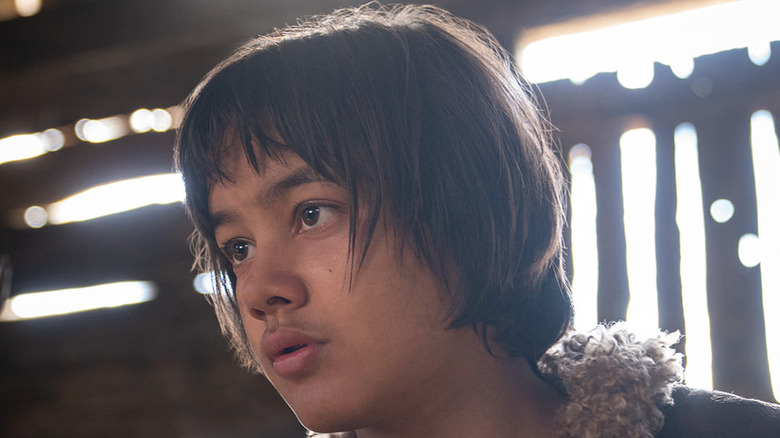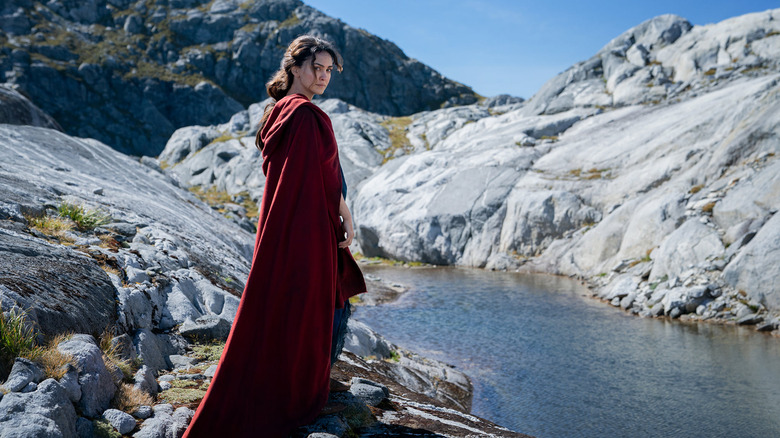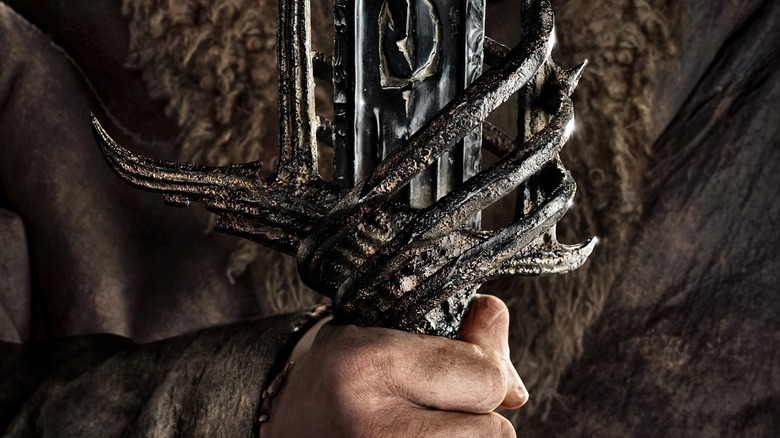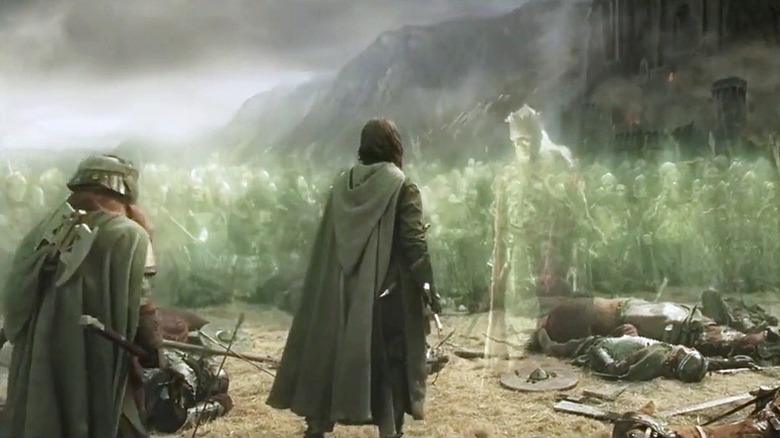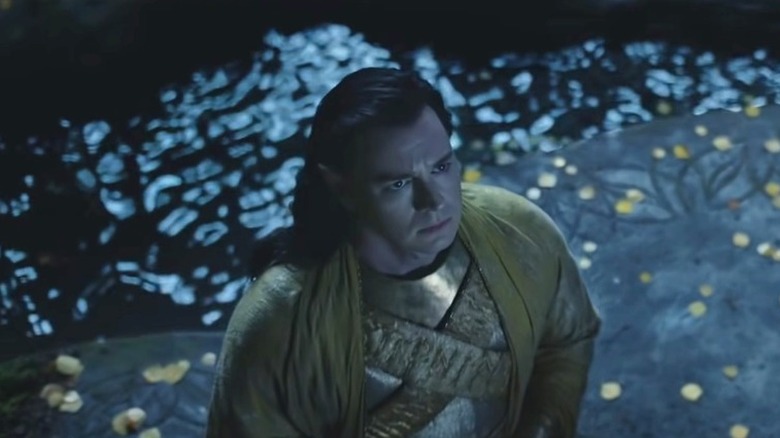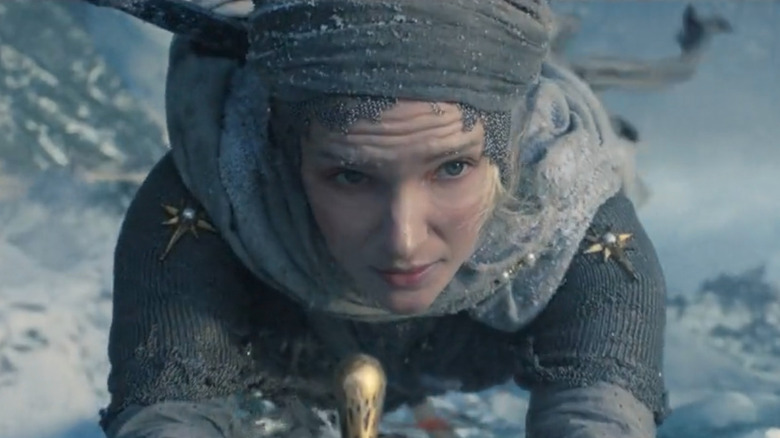The Lord Of The Rings: The Rings Of Power Is Going To Upset Tolkien Purists, And That's A Good Thing
"The Lord of the Rings: The Rings of Power" is still months away, and we're already struggling with the fact that it's going to be — gasp — different from the source material. We know that it's going to explore areas of Middle-earth that are barely addressed in Tolkien's writings. The untested showrunners have also clarified that they will be condensing everything down into a single event.
The recent announcement of yet another character invented for the story (via Twitter) — Theo, played by the similarly untested Tyroe Muhafidin — has also driven home another major change. The show is going to have to make up a gosh-darn lot of new characters to get this story to flow properly. In fact, Amazon Studios is going to need to take quite a few liberties with the skeletal source material, which will be the deciding factor that makes the show either an incredible success or an epic failure.
Sweeping changes like these are calculated risks that often have to be made — in some form or another — when adapting media from print to screen — or in this case, scattered book references to a unified, drawn-out, serialized cinematic story. This also means countless fans are going to be discomfited and dare we say it, even upset by many of the changes and interpretations that take place.
The material released (which is still rather paltry at best) has already drawn the ire of one group in the Tolkien fandom in particular: purists. While upsetting a fan base may seem like a bad thing on the surface, the truth is, enraging this particular group of followers may actually be a good sign.
New characters in Rings of Power is already a foregone conclusion
The idea of inventing new characters for a Second Age Middle-earth series is no longer a question. We know from the promotional material released thus far that there are going to be a lot of new faces in Amazon Studios' new show. So far, we're aware of a host of different newbies, including Nazanin Boniadi's Bronwyn, Ismael Cruz Cordova's Arondir, Markella Kavenagh's Nori Brandyfoot, Sophia Nomvete's Princess Disa, Charlie Vickers' Halbrand, and most recently, Tyroe Muhafidin's Theo. These characters populate many different races of Middle-earth, including Elves, Dwarves, Harfoots, and Men.
Taking creative liberties, like the addition of these new characters, is par for the course for most adaptations. In fact, "The Wheel of Time," another recent Amazon blockbuster, couldn't resist the temptation to add people — like Perrin's wife and an additional Aes Sedai — even in a world overcrowded with preexisting characters.
For "Rings of Power," the task is even harder. Sure, "The Lord of the Rings" comes fully stocked with plenty of characters to choose from. When Peter Jackson and company went to create a trilogy from the sparser "Hobbit" story, though, they found the need to pull in outside characters like Legolas and Azog, along with creating others like Tauriel.
A Second Age story cranks up the pressure even more because there are even fewer characters to work with in the first place. There's a long list of Númenórean kings, and we get a few major players, like Sauron and Isildur. Upper-crust Elves like Gil-galad, Galadriel, and Elrond are mentioned. By and large, though, there just isn't a lot of detailed character building to work with. This means that adapting the story requires the creation of a lot of new characters, like it or not.
Adaptations naturally need to adjust the source material
The term "adaptation" doesn't just mean you're translating something into another form. The Oxford Advanced Learner's Dictionary literally defines the term as "the action or process of changing something, or of being changed, to suit a new purpose or situation." When a story is adapted, it isn't just being mirrored into another form of media. It's also being changed and adjusted to fit that medium better.
Creative liberties like the addition of characters are a necessary element that "Rings of Power" has to tap into in order to make an on-screen version of Tolkien's Second Age story, well, not boring. Without these necessary additions, we'd end up with a story that looks like an old-school chronicle (which is freaking awesome to read, just not to watch).
The important thing to look for is if creative liberties are taking place to improve the story or merely to change it, potentially with other motivations in mind. In other words, are the changes taking place to contradict Tolkien's established source material, or are they enhancing a televised version of the story for a 21st-century audience?
The distinction is important. The plain fact of the matter is, you can't directly adapt the Second Age to the screen without making changes. You need to add in people, places, and events that will help create a more cohesive story. The simple fact that this is a reality of the show cannot be grounds for dismissing the adaptation wholesale.
On the contrary, these are some of the areas that we need to explore carefully as the show is released to see how faithfully the creators are adhering to the general tone and feel of Tolkien's world.
Past adaptations — including Tolkien's — have changed the source material
It's easy to forget how many parts of Peter Jackson's adaptation changed the narrative. Elves at Helm's Deep, Arwen saving Frodo, expanding on Aragorn and Éowyn's relationship, the Army of the Dead showing up at the Pelennor Fields, and scrapping the Scouring of the Shire are easy ones that come to mind. And yet we accept Jackson's adaptations as wonderful cinematic versions of Middle-earth — because we understand that some changes had to be made.
Even Tolkien understood how adaptations worked. In a famous letter written in 1958, which commented on the first attempt to adapt "The Lord of the Rings" to a film format, Tolkien provided copious feedback — most of which was negative — about his concern for the changes being made in the script (via Tolkien Gateway). He did not love reckless changes to his world and had a lot of issues when adaptations exercised unnecessary or inaccurate creative license.
All the same, in that letter, he suggests that either the Ents or the Battle of Helm's Deep should be entirely cut from the story, as in taken out entirely. To use his own words, "Actually I myself should be inclined to cut it right out, if it cannot be made more coherent and a more significant part of the story" (via StudyLib).
Again, Tolkien wasn't adaptation-happy. He zealously guarded his works against any attempted changes. But when push came to shove, he did accept that changes were necessary — even dramatic ones.
The impossible need for purity
We return once again to the issue of purists instantly taking umbrage at any perceived change in an adaptation, regardless of the motivation behind the adjustment or addition. Is this really a reasonable response? Part of the issue is that the "purist" moniker comes not only from the knowledge that certain fans amass but also their penchant to use it to criticize adaptations and reinforce their own validity.
That's right. Purists are often going to criticize with the use of free-wielding knowledge, regardless of the actual question at hand — and that's wrong. If you watch an adaptation, give it real thought, dig into the background of various decisions, and then decide that you thoroughly dislike it.
Judging an adaptation by its promotional material is akin to the old saying of judging a book by its cover. Rather than arguing for purity in an adaptation, consider the motivation behind the changes. Even Tolkien was perpetually tinkering with his scripts. This led to countless variations. Take Gil-galad as an example. Tolkien went back and forth about his parentage (via Tolkien Gateway). He died without making a firm decision, so his son Christopher did, choosing a specific lineage in the published version of "The Silmarillion" ... only to regret making a permanent choice later on.
This reveals a unique issue with being a Middle-earth purist. Which version of the text are you following? What right does a fan have to decide that "X" version of Tolkien's writings is the authoritative one? After all, the author tried and failed to publish "The Silmarillion" many times before it reached its current form. Who are we to say that the last one is the definitive version and not just another iteration of a living text in the eyes of its author?
Amazon is still on thin ice, though
However, just because adaptations can change the source material to a degree doesn't mean any and all changes are permissible. There's a point where a change can go too far. In the case of "The Hobbit," creating Tauriel could have been just a random addition that didn't rankle too many fans. Overly integrating her into the story — including a really random, Aragorn-Arwen-esque love affair with Kili — was just too much.
We've established that changes, and particularly additions, are needed. But the team producing "Rings of Power" needs to be careful to respect the source material — material that many avid fans think is unadaptable, no less — at all turns. On the plus side, the Tolkien estate approves of their plans (via Vanity Fair). Showrunner J.D. Payne specifically said, "We worked in conjunction with world-renowned Tolkien scholars and the Tolkien estate to make sure that the ways we connected the dots were Tolkienian and gelled with the experts' and the estate's understanding of the material."
That's all well and good, but there are many adjustments that can take place between the planning and execution phases of a show. Amazon Studios can pull off a successful Jacksonian adaptation if its additions and adjustments complement and enable the original story. Canon characters must be kept as accurate as possible (albeit within the flexibility of choosing from Tolkien's various versions of Second Age content written over the years), and the show should spend the bulk of its time building toward the larger story that already exists.
Whether this can be done or not remains to be seen. Here's to enjoying the process of discovering, enjoying, and ultimately, objectively judging what years of hard work have created.
